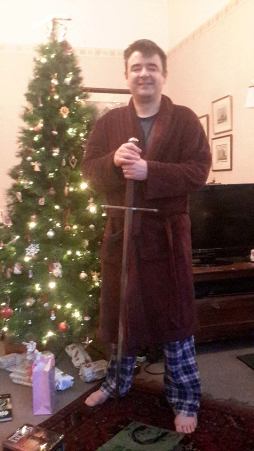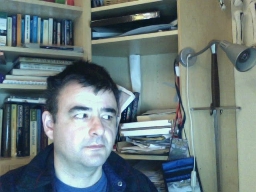Writerly New Year’s Resolutions and How to Make Them Work: Part 1

So here it is, AD2015. This being the 21st century, I hope you’re enjoying the belated rocket pack Santa finally brought you. (For some reason mine didn’t arrive and I got a sword instead.)
Judging from the way the local kids’ birthday parties usually fall between September and November, January is a time when people try to start something new, or at least make a fresh start. This is why the Internet is full of New Year Resolutions made by aspiring writers.
You know the kind of thing: This year I’ll… focus more on my writing… finish my novel… be more disciplined… write 10K words a week…. etc etc.
From the vague to the painfully specific, they mostly boil down to either being more productive, or else setting things up so you can be more productive.
Take being more productive.
First can we quickly discard the obsession with word count?
Yes, rapid drafting is a good thing, but really aggregate word count is what counts — time spent planning and revising is also valuable — and what that aggregate count counts towards is finishing a novel. So if you must measure your productivity, then please make a proper project plan with milestones and monitor yourself against that.
Now let’s turn to the most common subtext of productivity resolutions: the sporting idea that productivity and motivation are two sides of the same coin. A good pep talk — Steven Pressfield provides just about the best of these — and with proper motivation, you can blast through resistance, Bum In Chair (“BIC”), silence your inner critic, and Bob’s your uncle. Productivity! Hurrah!
Been there, done that. Maybe it’s because I’m British, but I think that’s putting the cart of enthusiasm before the horse of capability…

Look at it this way: if you want to write, then what’s stopping you?
You don’t have to motivate yourself to play video games, or an instrument in a band or a character in a roleplaying session, or to ply a sword in a LARP game or a HEMA salle.
Yes, these other things provide instant rewards (“Six! Plus one for the Sword of Smiting. I do seven damage!!” / “Go! Go! Johnny B. Goode!“) whereas if we’re struggling to get past chapter three of our first novel, writing seems to offer no reward, short term or otherwise.
However, it’s not that we dislike hard work — look at what else we do! No, we don’t need the cheerleaders and the drill sergeant, it’s that there often seems no meaningful hard work to do.
“Working on the novel” becomes staring into space and twitching through Facebook trying to find a non-boring sentence to write next before the nagging inner voices chew our self esteem to death. Switching off the Internet is not going to help because that’s not the problem.
But imagine if when you sat down to write, it just flowed? Nothing short of a zombie apocalypse would stop you (not even little girls demanding My Little Poney printables).
So I think if you want to be productive, then make sure you know how to write what you want to write, or have a way of learning to do it as you go along. Read books on writing by people with credentials. Find a regular workshop or crit circle to attend…
…which — the workshop/crit group I mean — will also help to motivate you.
Because even if you have no problem getting the words down, you do need some sense of purpose to keep you going.
Writing a novel part-time is a long game, and there are many, many more immediately productive things you could be doing. Regular sessions with a peer group of aspiring writers can generate some good short time goals, as well as some amazing ad-hoc pub crawls.
You’ll also feel more purposeful if you have at least a vague plan as to what you’ll do with the novel once it’s done. Get a sense of the market and where it’s going, how it works. There are blogs about this, but don’t forget the podcasts, especially Adventures in SciFi Publishing. You can also go to conventions, but bear in mind that these eat into your writing time, which leads us to…
…setting things up so you can be more productive, of which more next week.
M Harold Page (www.mharoldpage.com) is a professional author with several franchise books on Amazon plus his creative writing handbook, Storyteller Tools. He swears that learning to sword fight will boost your writing career. If you live around Edinburgh, Scotland, he’d love to teach you Medieval German Longsword.
AD2015 … nice sword! But don’t bring it to a laser fight.
Cool words about writing.
Oddly the sword comes with a free crate of EMP grenades.
I favor salted oat grenades. Stops the fairies in their tracks.
Is it always the object to your left that you reach for? Never noticed that. Someone (not me) needs to write a book about feng shui for horror film characters.
[…] can squeeze more into your existing writing time by having an effective writing process – we had that rant already in Part 1 – and by learning to touch […]